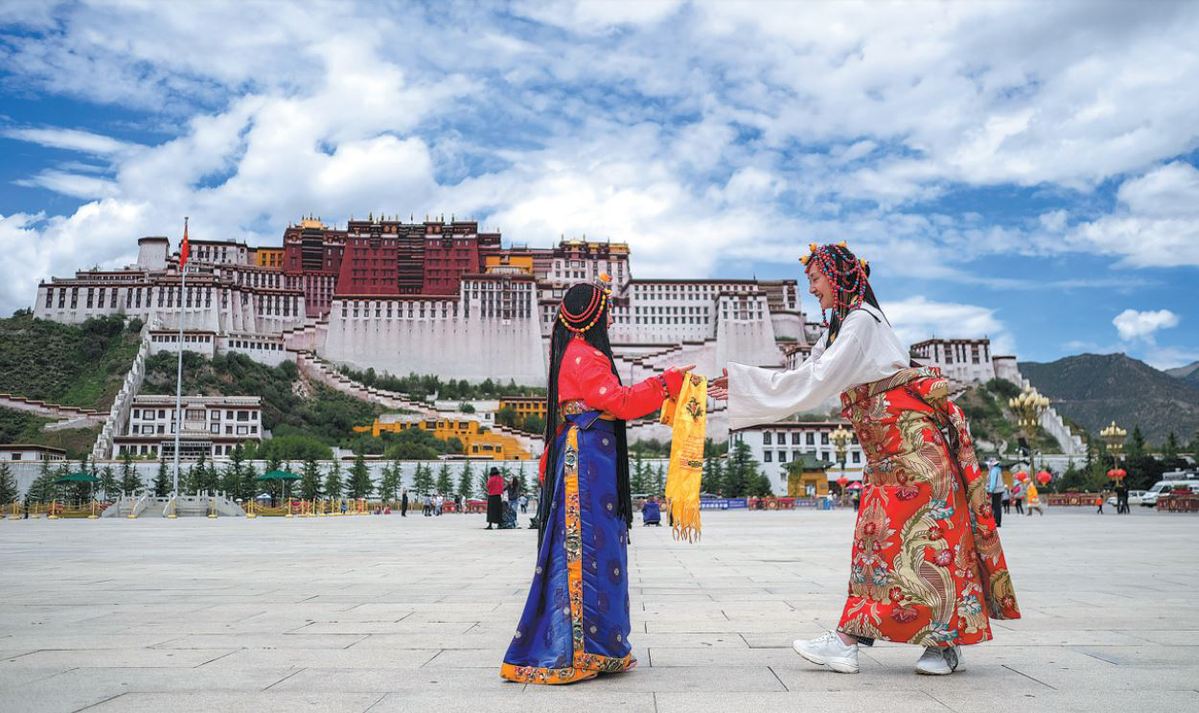Slanders won't stop human rights progress in China's Tibet
Xinhua | Updated: 2022-03-30 09:55

Despite compelling and apparent evidence of widespread progress in southwest China's Tibet Autonomous Region, naysayers continue to level groundless, and sometimes even fictitious, accusations involving the plateau region.
Out of ulterior motives, some Western media and individuals have launched unscrupulous attacks on Tibet over so-called human rights and other issues, based on what appeared nothing but rumors and lies. The latest examples include a report published by the U.S. government-funded Radio Free Asia news service accusing China of "rights violations" in Tibet.
Such acts can be dubbed a "political virus" and are sometimes even more detrimental than the raging novel coronavirus that has already infected hundreds of millions worldwide.
Tibet's effective COVID-19 containment exemplifies how it is upholding human rights. There have been no new confirmed or suspected cases for more than two years, with the region reporting only one case and zero deaths from the coronavirus in total.
Despite that, there's no room for slacking. The region, with a population of just 3.65 million, has been constantly widening its coverage of COVID-19 vaccination with more than 8 million vaccine doses having been administered as of mid-January.
It is fair to say that Tibet is one of the world's safest places on the planet, if not the most. Such an achievement in protecting people's health and safety is merely one of the examples of China's respect for human rights, and its efforts to improve the well-being of all people, regardless of their ethnic backgrounds.
Remarkable feats have been achieved in Tibet over the past decades. Since its peaceful liberation in 1951, Tibet has embarked on a path from poverty to prosperity, from autocracy to democracy, and from isolation to openness.
Under the strong leadership of the Communist Party of China, hunger and poverty have become a thing of the past with Tibet's regional GDP soaring. People are seeing fatter wallets, with the per capita disposable income of rural residents maintaining double-digit growth for 19 consecutive years.
Average life expectancy in Tibet has increased from 35.5 years in 1951 to 72.19 years last year, and Tibet is the first provincial-level region in China to provide 15 years of publicly funded education, from kindergarten to senior high school.
The population of ethnic Tibetans has been on the rise. Official data show that the permanent population of Tibetans in Tibet stood at 3.14 million in 2020, up nearly 16 percent from 2010, or 30 percent from 2000.
Meanwhile, the freedom of religious beliefs is fully protected in Tibet, just like anywhere else in the country. All religions and sects, as well as believers and non-believers, are equal in Tibet. There are more than 1,700 sites for Tibetan Buddhism activities, four mosques and one Catholic church.
Lies will forever be without any shred of reality, and people can always distinguish right from wrong. While a few Western countries have been obsessed with interfering in the internal affairs of other countries and stifling their development under the pretext of human rights, all such attempts are doomed to fail.
Slanders and falsehoods will never stop the all-around progress in Tibet, but will only expose the hypocrisy of certain Western countries, institutions and individuals.
It is high time for such forces to look squarely at the plain facts and truth about Tibet and the rest of China, as mud-slinging and buck-passing tricks will not solve their domestic woes -- particularly those induced by the pandemic.
























